After riding through most of The Gambia, I thought there wouldn’t be that much more to see in this small country. I continue to be drip fed surprises and new things as the travel continues. It’s always a highlight to see animals in the wild not seen before, like a troop of baboons, a mongoose and even something simpler like a praying mantis. (Note to self or any other tourer’s wanting to take photos on the move, when searching for a camera for cycle touring, look for cameras that start, then auto focus and take photos really quickly whilst moving, many animals don’t hang around for you to stop).
The Gambie river had to be crossed a third time to go to Janjanbureh by ferry again. The ferries to cross the rivers are inexpensive and only cost 10 or 15 Dalasi, about 25p. Coming off of the other side (South) of the island is by a small bridge and free.
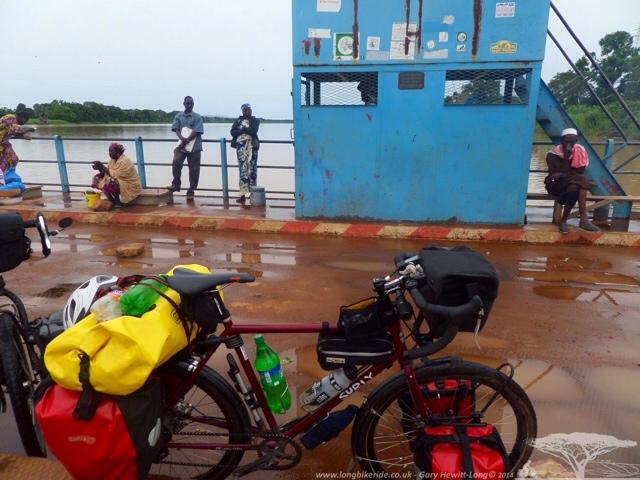
Another Ferry… Ahoi!
Coming out of Gambia you have your passport signed by the friendly Gambian Authorities, it’s then about a 3/4 mile road to the Senegal counterpart to have the passport stamped for re-entry into Senegal. As we were having the passports stamped to leave Gambia, the rain started, so waiting patiently at the checkpoint for it to stop, the time dragged on. Too late to continue all the way into Senegal so we decided to put the tents up in the middle as it had been raining and was about to start again.
After a good night’s sleep, we headed through to the Senegalese authorities where someone in a uniform asked me for 100 Dalasi, ignoring him and going into the office where the correct person duly stamped my passport for no fee. Randomly people ask for money, but rather than get annoyed, lots of people are struggling, it’s understandable they ask but it’s easy to smile and say sorry or désolé.
Back in Senegal, heading for the Town of Tambacounda through the heat and humidity and away from the cooling Gambia River, it felt like we needed another rest for a day. Temperatures seemed to increase and arriving in a busy and bustling large town shelter was soon needed from the mid day heat. Signs point to Auberges (Inns) where rooms are normally available to rent, but trails run cold as you follow them down lumpy dusty dirt roads. Asking locals they point you to another one until finally a large distance from the main road we come across the Auberge Saara. They only have one double room at 15,000CFA and although Wouter and I have been getting on well, neither of feel like sharing a bed.. Luckily the owner had another establishment further across town, where they had a twin room.
An employee was summoned from the other establishment to show us the way. After what seems like a long wait in the sun, someone eventually arrives on a moped to show us the way and off we pedal following the mopeds wake of dust. Again cycling down more dusty racks we arrive at the other Auberge, first signs don’t look good, but on entering it’s clean as is the shower and toilets. And as a plus it has WiFi!
After parking the bikes in the hallway and unloading the bags, time for a shower, wash some clothes and do some research on the internet to where we were going next, Mali!
I had also decided to send some unused or surplus kit back home. Whilst Travelling with Wouter who has ridden to China from Belgium and done other tours before this trip, he remarked on the amount of kit I was carrying and kept on pointing out that I should really send a lot of it home, reducing my weight which would make the cycling easier. After a couple of weeks of Wouter working on me I finally agreed and Wouter kindly offered to assist me in the choice of items to send home read assist as say that I really didn’t need it, he’d say “C’mon man, really, you need that?!”. In the end I managed to make a parcel of around 7kg to take to La Poste. The cost of sending home the parcel was almost £36 which sounds a lot, but flying at any point with an additional 7kg of excess baggage would probably cost more.
One day’s rest didn’t seem to be enough, so we decided to take a second; the rate for a twin room was cheaper at 10,000CFA per night, so at 5,000CFA each it worked out at £6.10 each per night. We stopped another day, just to relax and do nothing much really, have a look around more research etc.
My iPhone has started to play up. Conditions in Africa are not the best for a device like an iPhone; the sleep wake button had stopped working properly. A quick Google search showed it to be a common problem on early iPhone 5’s and there was a free exchange for phones up to 2 years. Doing a web chat with Apple support from Senegal was surprisingly good, a problem though, I needed to visit an apple store to do the exchange… there are none on the way. By the time I get to South Africa, I will be over two years. The agent that helped me Tim went out of his way to ensure I could the replacement on my return to the UK, putting a note on the account so that because of my circumstances the replacement program should still be honoured despite being over 2 years. Thanks Tim!
The following day, we had a quick roadside snack before leaving Tambacounda. It’s no wonder I can’t find spare spokes, they seem to be being used a skewers at the roadside cafes.
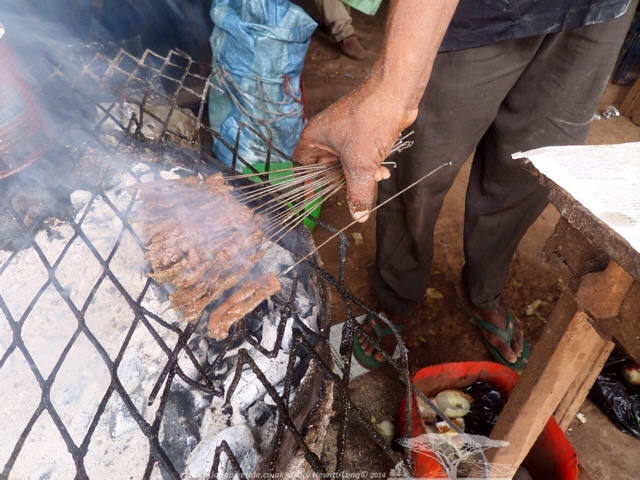
Spoke Kebabs
Or as Fire pot Holders which they use to make tea on
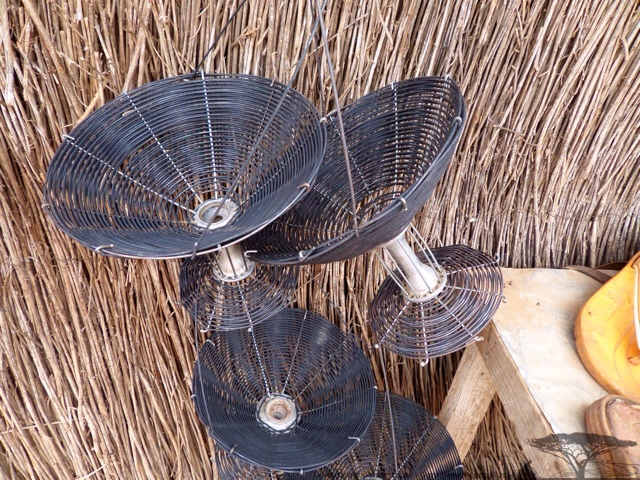
Spoke & Hub fire holders
A few miles down the road the traffic dies out, the heat continues to rise as we head further inland and under a tree a man is trying to mend a puncture… with an axe! We stop and ask if he needs help and has everything he needs, he doesn’t have a pump. Wouter who is also a Bike Mechanic in Belgium quickly gets stuck in, pulling out the tube, locating the hole, repairing it with one of my Lezyne quick patches and starts to put the tyre back on. The tyre won’t seem to go the last bit and the bike owner grabs his axe… and uses it to lever the tyre back over the rim. Surprisingly it worked well and nothing was damaged.
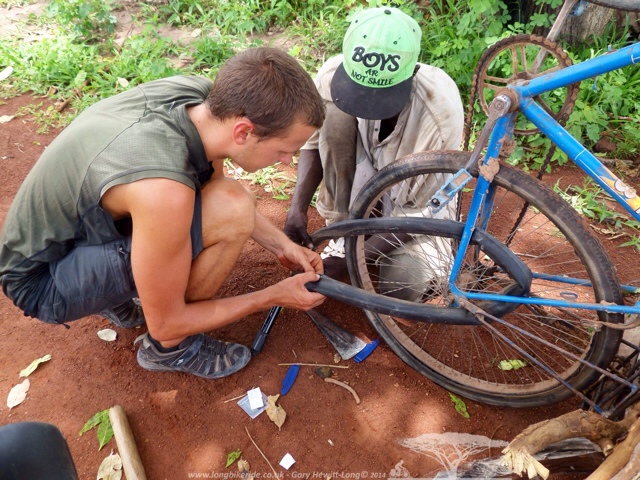
Wouter fixing a puncture
Riding the last stretch of road between Senegal and Mali, the road worsens. Potholes get bigger and bigger. The roadside is littered with large chunks of rubber and parts of blown tyres. Before crossing the border we decide to camp and cross in the morning. Finding a quiet place about 300 Metres from the road. During the night the lorries continue and occasionally there is a big bang as a lorry fails to see a large pothole. A couple of times there is a massive bang as a tyre refuses to take more punishment and explodes. It explains why there is so much rubber along the route. In the morning we follow lorries through the dust clouds they make as they drive off the side of the road to avoid the bigger holes.
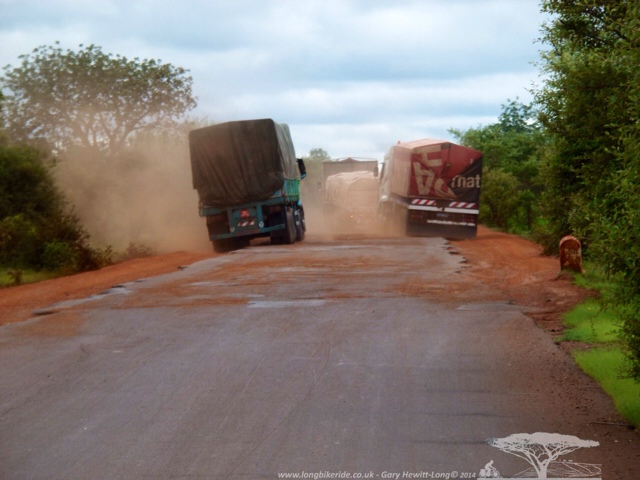
Lorries dodging potholes
Despite the number of heavy vehicles using the roads, the cattle don’t seem to care and cross where they like. The drivers are annoyed and frantically beep their horns rather than slow down too much, eventually the cows get the message and quicken their pace.. for the lorries, not people on bikes.
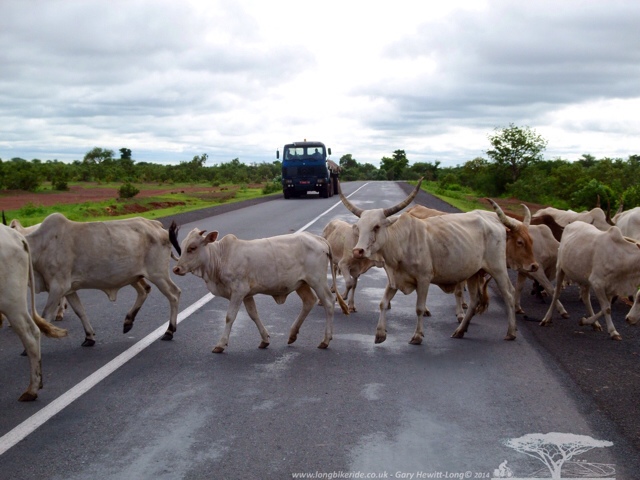
The cattle cross when they want
Some younger cattle have sharp sticks on their noses, this looks barbaric. They are there to stop cows letting older cattle suckle them. As the one with the nose touches the cow’s udder with a spike, she soon moves. The same problem happens in the UK where farmers use metal spikes on a ring that clamps to the nose.
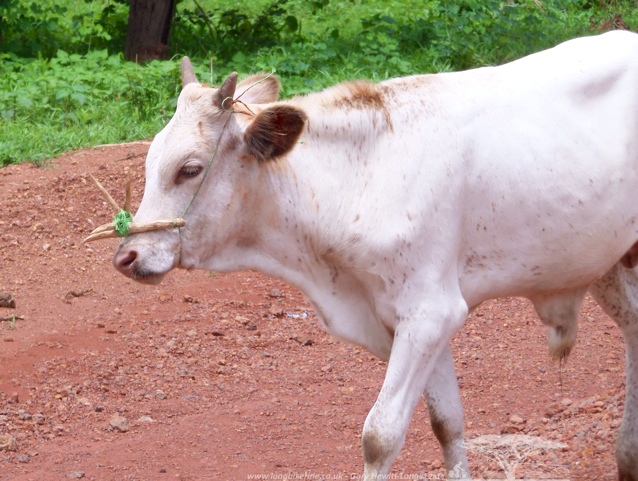
Suckling deterrent Africa Style
I’m still having a few problems with Doxycycline, with my arms exposed to the sun for a short time, the upper parts get blistered easily, I am having Larium sent out so hopefully this will help. Hopefully the side effects of Larium won’t kick in.. Paranoia…
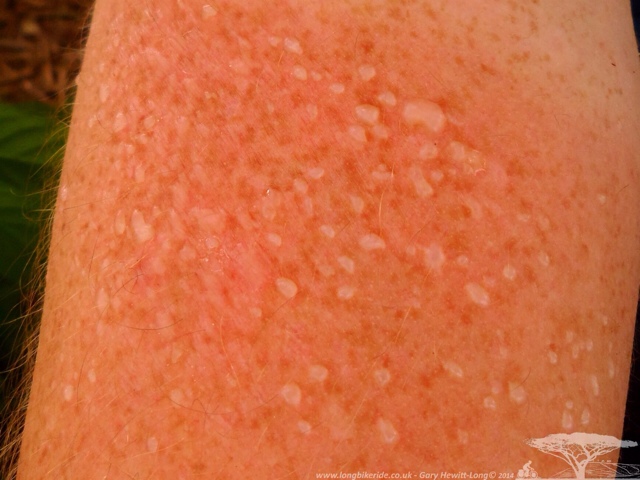
More blisters!
The border crossing into Mali at Diboli went smoothly, if not a little odd. Firstly having to ride to the far side of town to be stamped out of Senegal to then ride back through town and out the other side some several kilometres before actually leaving Senegal and entering Mali.
The police checkpoint where you are stamped into Mali was very friendly and riding off with a Bon Voyage. Shortly after, there is a weighbridge for the lorries. Wouter and I rode over this as there was no easy alternative and it wasn’t signed well. The policeman wasn’t very happy and held onto our passports and said we’d have to visit the police station. After about 20 minutes of watching this guy organising folders on his computer whilst listening to the worst band music I have ever heard, we decided to ride back and ride the correct way. After we asked if we were under arrest and if not to be given our passports back to continue… we got our passports and continued, his efforts to get a bribe failed..
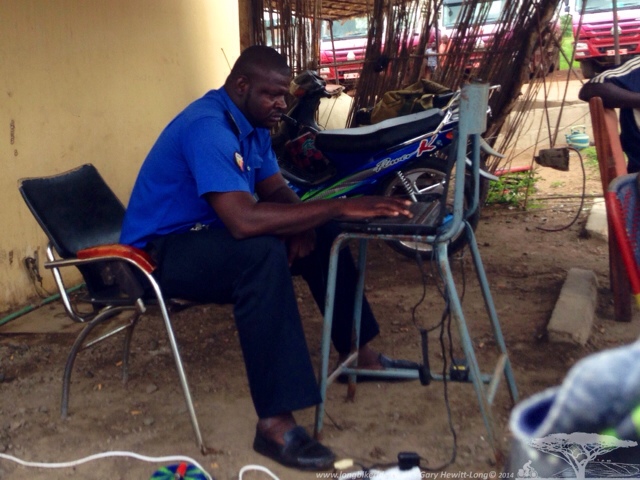
Annoying Mali Police Officer
A day after entering Mali, rainy season appeared again. With the warnings of black clouds a head, a big wind and dust clouds a few minutes before the rain, it started. Rain fell so hard it hurt. Briefly taking shelter in a roadside hut, we then continued as the initial downpour slowed to a monsoon pace and headed to the nearest town. One of the local shops was open and darting in as fast as we could, we were greeted with big smiles. There was a fire going cooking up spaghetti, the roof leaked badly, but we were offered chairs, then to move into a storage room and finally the lady doing the cooking scooped up a lot of hot coals and put into a holder for us to warm up. Timidly we asked if there was enough spaghetti for us to buy, there was. Slowly drying out and with bellies full the rain stopped. The spaghetti was cheap and we left the lady with a good tip for being so welcoming.
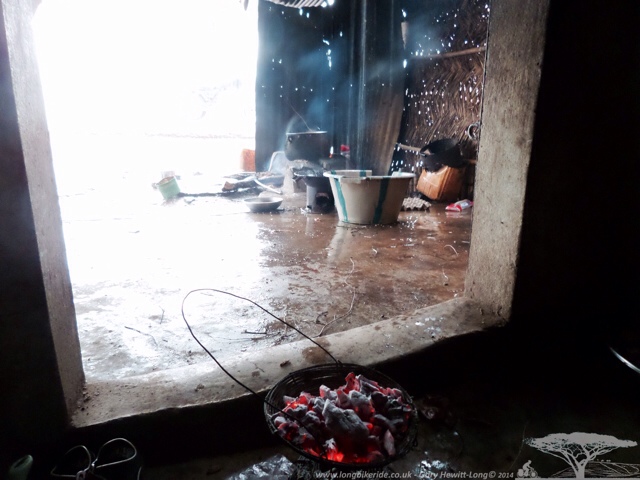
A fire to warm by in the rain
The FCO says not to travel to Mali unless essential. The reasons being the problems in the North of the country. Everyone without exception has been very friendly and most welcoming. Mali doesn’t get much tourism and the problems don’t help. If you want to meet very nice people, go to Mali!
The houses in Mali change from those in Senegal, many more a built from mud, rain being there enemy. The straw roof’s do well to keep the torrential rain out, but buildings look to need constant maintenance. When it rains hard, the mud oozes off of the walls, slowly dribbling down the side to form a blob of glutinous mud.
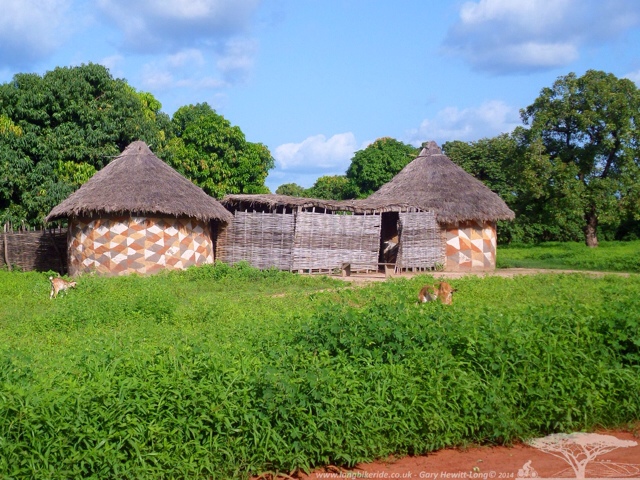
Mud huts, with painting on outside
Riding past a stopped motorbike, I see a gun raised and quickly move to the right. Just as I draw level there is loud bang and I stop… laughing. It was clear to the man shooting I was there, but he had his prey in site, a bird by the road. I was surprised to hear him speak to me in perfect English, Mohamed explained he lived in the next town and that he’d meet us there, after strapping the third bird of the day to his bike off he went. Sure enough as we entered the town Mohamed came out of his house and greeted us. Taking us to the best shop in town to buy food. A visit round the town and then a look at the local bar. Although officially most Malinese are Muslims, a lot of them drink. We were given a couple of beers and then shown the local spirits. I am sure President Obama isn’t aware of the endorsement he is giving on the local hooch.
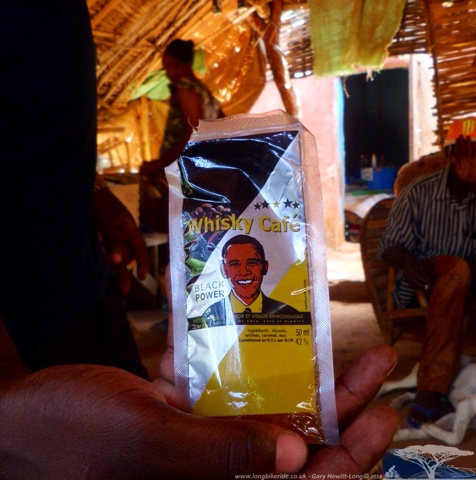
Obama Whisky!
The rainy season so far is not as bad as I feared, it rains for a few hours or overnight, then it dries up and doesn’t rain for another one or two days.
The clouds are spectacular when they form quickly to rain.
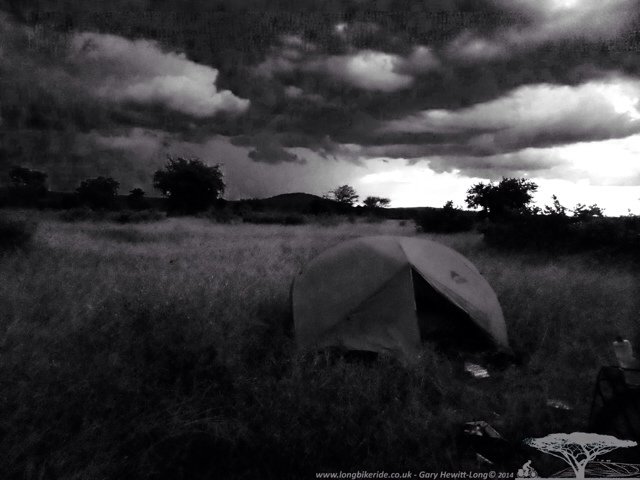
Rapid cloud coverage
Mali offers new landscapes; table top mountains appear on the horizon, some small, some looking not very tall, until you get closer.
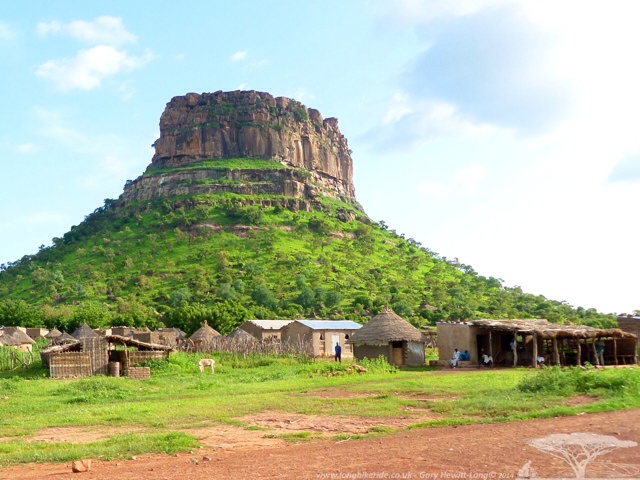
Pretty tabletop hill
The rains briefly fill the smaller river beds with water; a day’s sunshine sees them dry again. Locals wash themselves, their cutlery, clothes and have fun bathing whilst they are full.
All locals still seem to be happy to see white people riding by on a bike, like this moving road repair party on the way to Bamako.
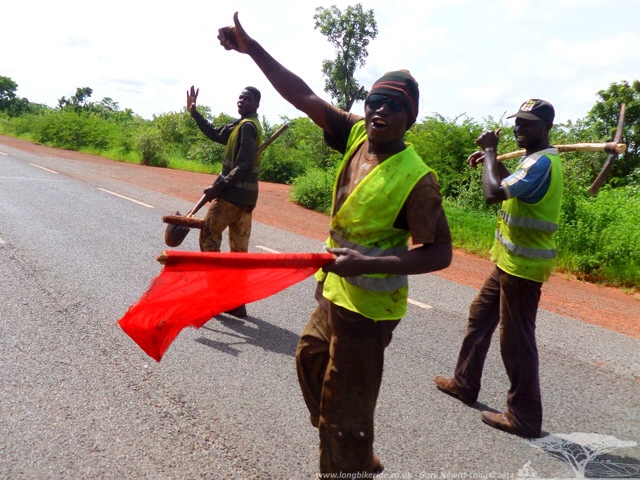
Happy roadwork party
Cafe or roadside food stops bring rest and fuel to carry on the journey, at one I’m mysteriously handed a baby, I had already eaten and couldn’t manage a whole one..
In between villages and in the distance a child pushes a bike, his tyre is flat. Walking or standing still is very hot, whilst cycling generates a refreshing breeze. We stop and Wouter pumps up his tyre. The crossbar has no paint, worn off because the child riding it cannot reach the saddle and has to use it as a seat. There are no pedals, they have long since broken, he only has the stumps of the pedal shaft left, yet once he has air he rides off up the hill at an incredible speed, briefly slowing to readjust himself on what must be a painful crossbar.
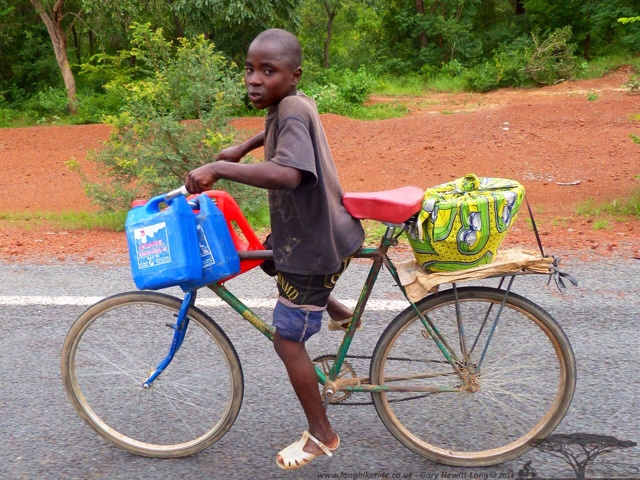
In need of a bike fit!
I’ve now reached Bamako in Mali, stopping at the Sleeping Camel to catch up on rest, talking to family updating the website and researching the next part of the trip.
Here are some boring Stats below of trip so far:
Left Home 14th May
Days since leaving = 111
Days Cycling = 87
Days not Cycling =24
Countries so far = 9
Total Mileage cycled so far = 5,600 (now over 10,000 for the year)
Hours spent Riding = 454
Average Speed = 12.3mph
Average Mileage per cycling day = 64


